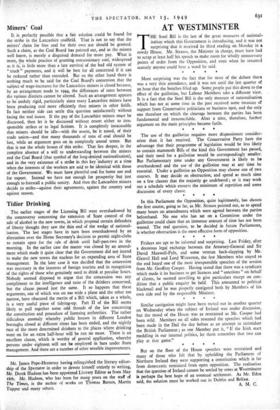Tidier Drinking
• The earlier stages of the Licensing Bill were overshadowed by the controversy concerning the extension of State control of the sale of alcohol to the new towns, in which proposal certain defenders of liberty thought they saw the thin end of the wedge of national- isation. The last stages have in turn been overshadowed by an altercation over the Home Secretary's decision to permit night-clubs to remain open for the :ale of drink until half-past-two in the morning. In the earlier case the matter was closed by an amend- ment which made it quite clear that the Government did not intend to make the new towns the nucleus for an expanding area of State management. In the later case it was decided that the concession was necessary in the interests of foreign tourists and in recognition of the rights of those who genuinely need to drink at peculiar hours. Nobody seemed disposed to argue that the concession was any compliment to the intelligence and taste of the drinkers concerned, but the clause, passed just the same. It so happens that these arguments, one of which was on too wide a plane and the other too narrow, have obscured the merits of a Bill which, taken as a whole, is a very useful piece of tidying-up. Part II of the Bill seems likely to pull together some odd threads of the law concerning the constitution and procedure of licensing authorities. The rather ridiculous anomaly whereby public houses in different London boroughs closed at different times has been ended, and the nightly race of the more determined drinkers to the places where drinking went on for an extra half-hour will be run no more. There is an excellent clause, which is worthy of general application, whereby persons under eighteen will not be employed in bars under State management. And there are a number of other sensible improvements.






































 Previous page
Previous page